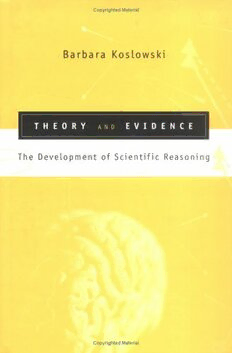Download Theory and Evidence: The Development of Scientific Reasoning PDF Free - Full Version
Download Theory and Evidence: The Development of Scientific Reasoning by Barbara Koslowski in PDF format completely FREE. No registration required, no payment needed. Get instant access to this valuable resource on PDFdrive.to!
About Theory and Evidence: The Development of Scientific Reasoning
In Theory and Evidence Barbara Koslowski brings into sharp focus the ways in which the standard literature both distorts and underestimates the reasoning abilities of ordinary people. She provides the basis for a new research program on a more complete characterization of scientific reasoning, problem solving, and causality. Long acknowledged for her empirical work in the field of cognitive development, Koslowski boldy criticizes many of the currently classic studies and musters a compelling set of arguments, backed by an exhaustive set of experiments carried out during the last decade. Theory and Evidence describes research that looks at the beliefs that people hold about the type of evidence that counts in scientific reasoning and also examines how those beliefs change with age. The primary focus is on the strategies that underlie actual scientific practice: two general sorts of research are reported, one on hypothesis testing and the other on how people deal with evidence that disconfirms a given explanation—the process of hypothesis revision. Koslowski argues that when scientific reasoning is operationally defined so that correct performance consists of focusing on covariation and ignoring considerations of theory or mechanisms, then subjects are often treated as engaging in flawed reasoning when in fact their reasoning is scientifically legitimate. Neither relying on covariation alone nor relying on theory alone constitutes a formula for success. A Bradford Book. Learning, Development, and Conceptual Change series
Detailed Information
| Author: | Barbara Koslowski |
|---|---|
| Publication Year: | 1996 |
| ISBN: | 9780262112093 |
| Pages: | 208 |
| Language: | English |
| File Size: | 13.68 |
| Format: | |
| Price: | FREE |
Safe & Secure Download - No registration required
Why Choose PDFdrive for Your Free Theory and Evidence: The Development of Scientific Reasoning Download?
- 100% Free: No hidden fees or subscriptions required for one book every day.
- No Registration: Immediate access is available without creating accounts for one book every day.
- Safe and Secure: Clean downloads without malware or viruses
- Multiple Formats: PDF, MOBI, Mpub,... optimized for all devices
- Educational Resource: Supporting knowledge sharing and learning
Frequently Asked Questions
Is it really free to download Theory and Evidence: The Development of Scientific Reasoning PDF?
Yes, on https://PDFdrive.to you can download Theory and Evidence: The Development of Scientific Reasoning by Barbara Koslowski completely free. We don't require any payment, subscription, or registration to access this PDF file. For 3 books every day.
How can I read Theory and Evidence: The Development of Scientific Reasoning on my mobile device?
After downloading Theory and Evidence: The Development of Scientific Reasoning PDF, you can open it with any PDF reader app on your phone or tablet. We recommend using Adobe Acrobat Reader, Apple Books, or Google Play Books for the best reading experience.
Is this the full version of Theory and Evidence: The Development of Scientific Reasoning?
Yes, this is the complete PDF version of Theory and Evidence: The Development of Scientific Reasoning by Barbara Koslowski. You will be able to read the entire content as in the printed version without missing any pages.
Is it legal to download Theory and Evidence: The Development of Scientific Reasoning PDF for free?
https://PDFdrive.to provides links to free educational resources available online. We do not store any files on our servers. Please be aware of copyright laws in your country before downloading.
The materials shared are intended for research, educational, and personal use in accordance with fair use principles.

